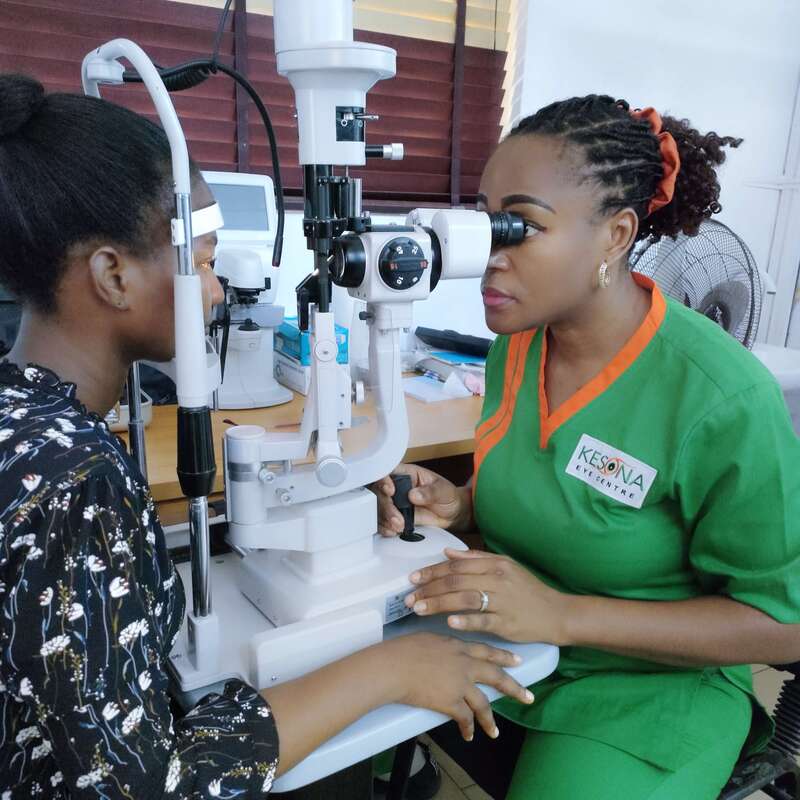As you already know, digital devices are essential for work, and so are here to stay. But, protecting your eyes from digital screen light is essential to minimize your exposure for the following reasons.
Too much exposure to screen light causes eye strain and discomfort: Using digital devices for prolonged hours exposes the eyes to too much light at a close range. This can cause mild to severe eye discomfort or eyestrain because the light can trigger or worsen light sensitivity, glare and migraine headache, which all have uncomfortable symptoms.
This condition is usually worse when the light from the screen is bright because the brighter the light from the screen, the more high-energy light (blue light) it contains. Blue light scatters more than other wavelengths of visible light and makes the eyes work harder to focus when exposed to it.
There is a risk of long-term eye damage: While the evidence on the short-term effects of blue light on the eyes like eyestrain is well known, there are conflicting reports on its long-term effect. Some research studies say it damages the retinal cells over time and causes a sight-threatening condition known as age-related macula degeneration. Others say otherwise. While this debate is ongoing, it is wise to protect the eyes against blue light now, instead of waiting for a unanimous agreement on the long-term effects and then later discovering that it actually damages the eye.
It can cause insomnia: Blue light helps keep the body alert, and with healthy exposure (during the day), your body can maintain a healthy sleep/wake cycle. However, too much exposure, especially close to bedtime can make it difficult to fall asleep at night.
How to Protect Your Eyes
Option 1 – Limit screen time to a maximum of 2 hours a day.
Option 2 – Install good quality anti-reflective and blue light filtering apps on all your digital devices.
Option 3 – Wear eyeglasses with protective lenses like our blue UV protection glasses.
Which Option is the Best?
The best option for you depends on your situation. Some factors to consider include:
The time you spend on your devices: If you spend more than 2 hours on your digital devices every day, the first option is not for you. Consider going for the 2nd or 3rd option or both.
Whether your devices have effective eye protection apps or not: This may be a good option if you do not need glasses to see.
Whether or not you need prescription glasses to see: If you need glasses to see well, option three is a no-brainer. Even if you do not need glasses to see, option 3 may be better for you, especially if your devices do not come with good quality eye protection apps or these apps do not give you enough relief.
For personalized guidance on the best way to protect your eyes from digital screen light, consult your eye doctor.
Tips to Limit Screen Time
1 – Set a schedule for digital device use and stick to it
If you do not work with digital devices, you can set one or more specific times a day to do things like check and respond to your emails and catch up with friends on WhatsApp and other social media platforms. You could spend 20 – 60 minutes at a time and not more than 2 hours the whole day if you decide and stick to it.
2 – Reduce non-work-related triggers, like alerts and notifications that make you pick up your phone
These alerts can make you pick up your phone more frequently than necessary. If there is nothing serious you are doing, you may start scrolling/browsing unconsciously and aimlessly. Before you realize it, you have spent so much time staring at your screen for nothing.
3 – Do your planning with paper and pen
Many people who work with digital devices spend a lot more time doing the mental work of planning than doing visible work like reading, typing or communicating with others. Since the bulk of planning involves thinking, doing it with your digital devices will make you spend much time staring at the screen without doing any visible work. But, if you use paper and pen to plan, you eliminate all those times you spend thinking and staring at the screen without reading, typing or communicating with anyone. This would reduce the time you spend on your digital devices.
4 – Opt for paper versions of the things you read
It is often a lot more convenient to access all the information you need on one device, but if your goal is to reduce the time you stare at your digital screens, you can achieve that by opting for the paper versions of things like the bible, books, newspapers, magazines and other digital materials with printed versions.
Common Protective Lenses
1- Anti-reflective lenses
These are lenses coated with an anti-reflective coating that eliminates the reflection of your digital screen light on your glasses. This reduces glare and makes vision clearer. So people who need glasses to see (prescription glasses) experience clearer vision with anti-reflective lenses than uncoated lenses of the same power.
2 – Anti-blue lenses
These lenses are anti-reflective lenses infused with substances that block blue light. Depending on the quality of the antiblue lenses, they can block anywhere from 10% to 90% of blue light emitted from digital devices and may also have UV protection properties. So, in addition to eliminating light reflections, they minimize blue light sensitivity and this further reduces eyestrain and the risk of long-term eye damage. Therefore, antiblue lenses offer more protection against digital screen light than regular anti-reflective lenses. But, the extent of protection varies from brand to brand depending on the proportion of harmful blue light they block off and their UV protection ability.
3- Photochromic lenses
These are lenses that are reactive to light and also offer protection against UV radiation. The lenses are clear indoors and darken when you go outdoors during the day. This makes them suitable for protecting your eyes against digital device light sensitivity indoors and sun sensitivity (or UV radiation) outdoors. These lenses can be enhanced with anti-reflective coating and blue light blockers. The enhanced versions are usually recommended for better protection against digital screen light when anti-reflective or anti-blue lenses alone do not give maximum relief from digital light sensitivity.
All things being equal, this is how we rank currently available lenses based on their ability to protect the eyes against digital screen light.
- Photochromic Antiblue UV
- Clear Antiblue UV
- Photochromic Anti-reflective
- Regular Anti-blue
- Anti-reflective
To read our MD’s review of her own glasses for digital screen light protection, visit the link below.
https://www.eyecarewithdrrose.com/reviews/light-sensitivity-glasses/.
To choose the type of lens that will suit you best, please consult your eye doctor.


